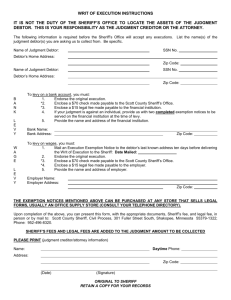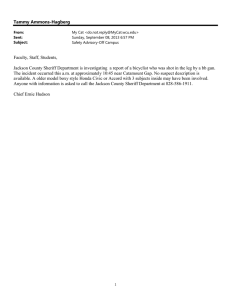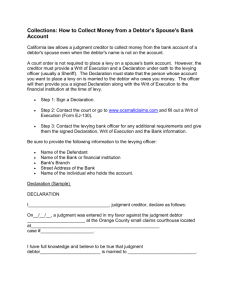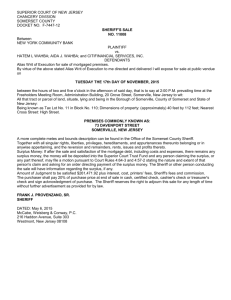Writ of Execution: Olmsted County Sheriff's Office Guide
advertisement
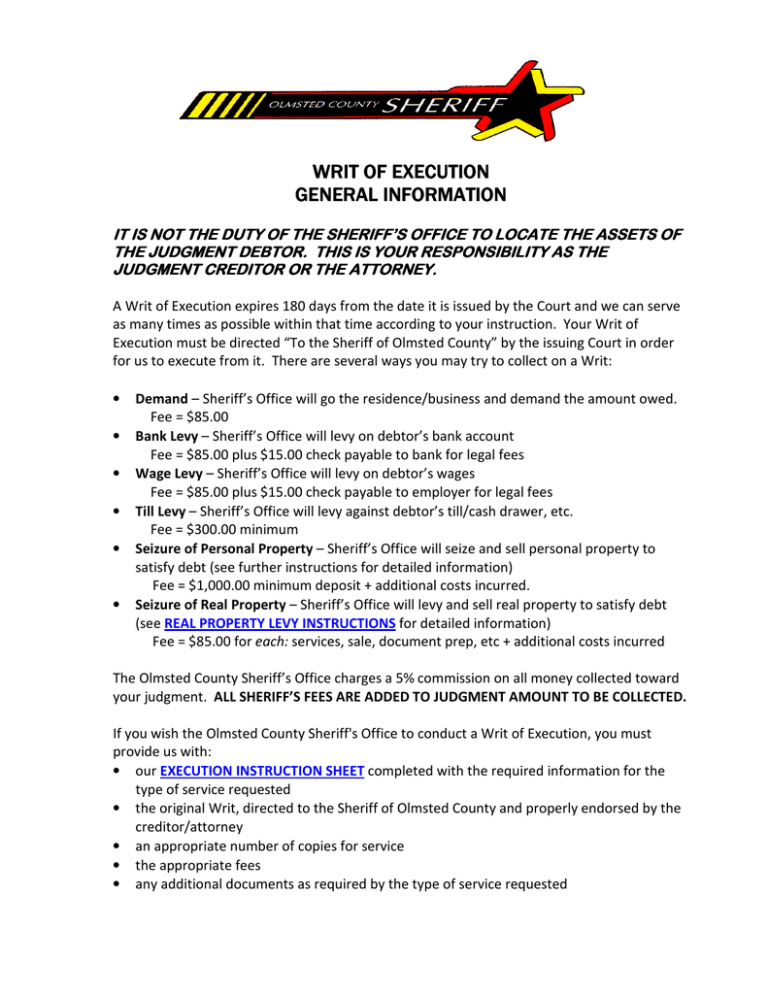
WRIT OF EXECUTION GENERAL INFORMATION INFORMATION IT IS NOT THE DUTY OF THE SHERIFF’S OFFICE TO LOCATE THE ASSETS OF THE JUDGMENT DEBTOR. THIS IS YOUR RESPONSIBILITY AS THE JUDGMENT CREDITOR OR THE ATTORNEY. A Writ of Execution expires 180 days from the date it is issued by the Court and we can serve as many times as possible within that time according to your instruction. Your Writ of Execution must be directed “To the Sheriff of Olmsted County” by the issuing Court in order for us to execute from it. There are several ways you may try to collect on a Writ: • • • • • • Demand – Sheriff’s Office will go the residence/business and demand the amount owed. Fee = $85.00 Bank Levy – Sheriff’s Office will levy on debtor’s bank account Fee = $85.00 plus $15.00 check payable to bank for legal fees Wage Levy – Sheriff’s Office will levy on debtor’s wages Fee = $85.00 plus $15.00 check payable to employer for legal fees Till Levy – Sheriff’s Office will levy against debtor’s till/cash drawer, etc. Fee = $300.00 minimum Seizure of Personal Property – Sheriff’s Office will seize and sell personal property to satisfy debt (see further instructions for detailed information) Fee = $1,000.00 minimum deposit + additional costs incurred. Seizure of Real Property – Sheriff’s Office will levy and sell real property to satisfy debt (see REAL PROPERTY LEVY INSTRUCTIONS for detailed information) Fee = $85.00 for each: services, sale, document prep, etc + additional costs incurred The Olmsted County Sheriff’s Office charges a 5% commission on all money collected toward your judgment. ALL SHERIFF’S FEES ARE ADDED TO JUDGMENT AMOUNT TO BE COLLECTED. If you wish the Olmsted County Sheriff's Office to conduct a Writ of Execution, you must provide us with: • our EXECUTION INSTRUCTION SHEET completed with the required information for the type of service requested • the original Writ, directed to the Sheriff of Olmsted County and properly endorsed by the creditor/attorney • an appropriate number of copies for service • the appropriate fees • any additional documents as required by the type of service requested When we stop levying, we will settle your account and mail you the funds collected toward your judgment and fees; at that time we will return your Writ to the Court. If the judgment is not fully satisfied and you wish further levy service, you must obtain a new Writ of Execution from the District Court. DEMAND This is a onetime service upon the debtor by the Sheriff’s Office on your behalf, demanding payment of their debt owed you. We will offer to accept payments and will allow them to establish a payment plan, however, we do not monitor collections. When the Writ expires, we will remit your portion of any funds collected to you. BANK LEVY This is a onetime service upon a financial institution which you believe holds account(s) for the debtor. When a third party Levy on Cash is served, funds on deposit in the specified account(s) owned by the debtor are frozen as of the date of service. The debtor is notified by the bank and has 14 days to claim an exemption. Once that period passes and no exemption has been filed, the financial institution will remit those funds by mail to the Sheriff’s Office. The entire process will take approximately 30 days after date of service. WAGE LEVY A third party Levy on Earnings will garnish wages for 70 days following date of service, after which time the employer will remit any withheld funds to us. The levy can then be served again to garnish for another 70 days if we receive the necessary fees and instructions from you. In the event no monies are collected pursuant to the Sheriff’s levy (i.e.: no funds in any accounts, employment terminated, insufficient wages to garnish, leave of absence, etc.) notice will be mailed to you giving the reason. If no further service is requested of us, the Writ of Execution will be returned to the District Court as unsatisfied. You must then locate other assets, obtain a new Writ of Execution from the court and deliver it to the Sheriff’s Office for service. If you know of no other assets, contact District Court regarding the procedure for ordering the judgment debtor to divulge their assets. If you are requesting the Olmsted County Sheriff's Office seize and execute sale of motor vehicles to satisfy a Writ of Execution, you must provide the following to us: • A printout from Department of Motor Vehicles (DMV) listing all vehicles registered to the judgment creditor. This can be obtained by sending a written request along with a copy of the Writ of Execution to: Department of Motor Vehicles, 444 Cedar, C-180, St. Paul, MN 55101. If you appear in person, you must produce the Writ of Execution at that time. The DMV charges a fee for this service; you can contact them for information by calling 651-296-6911 or visiting their website at www.dps.state.mn.us • The original Writ of Execution, endorsed by you. • The state allows the debtor an automatic exemption for one motor vehicle. Consult the MN Dept of Commerce website for current exemptions under Chapter 325G. • A deposit in the amount of $1,000.00 per vehicle. • All fees associated with removal, transportation, storage, publishing costs, document preparation, etc. are the responsibility of the plaintiff If you are requesting the Olmsted County Sheriff's Office seize and execute sale of personal property to satisfy a Writ of Execution, you must provide the following to us: • Personal property instructions must list and describe in detail the property to be seized and its location in such a manner that no other property could reasonably be mistaken for the wanted property. • A written statement or other evidence of whether the property is registered to the defendant and also whether it is secured or not. • The state allows automatic exemption amounts for each type of property. Consult the MN Dept of Commerce website for current exemptions under Chapter 325G. • A minimum deposit of $1,000.00 is required with the request. • All fees associated with property removal, transportation, storage, publishing costs, document preparation, etc. are the responsibility of the plaintiff.
